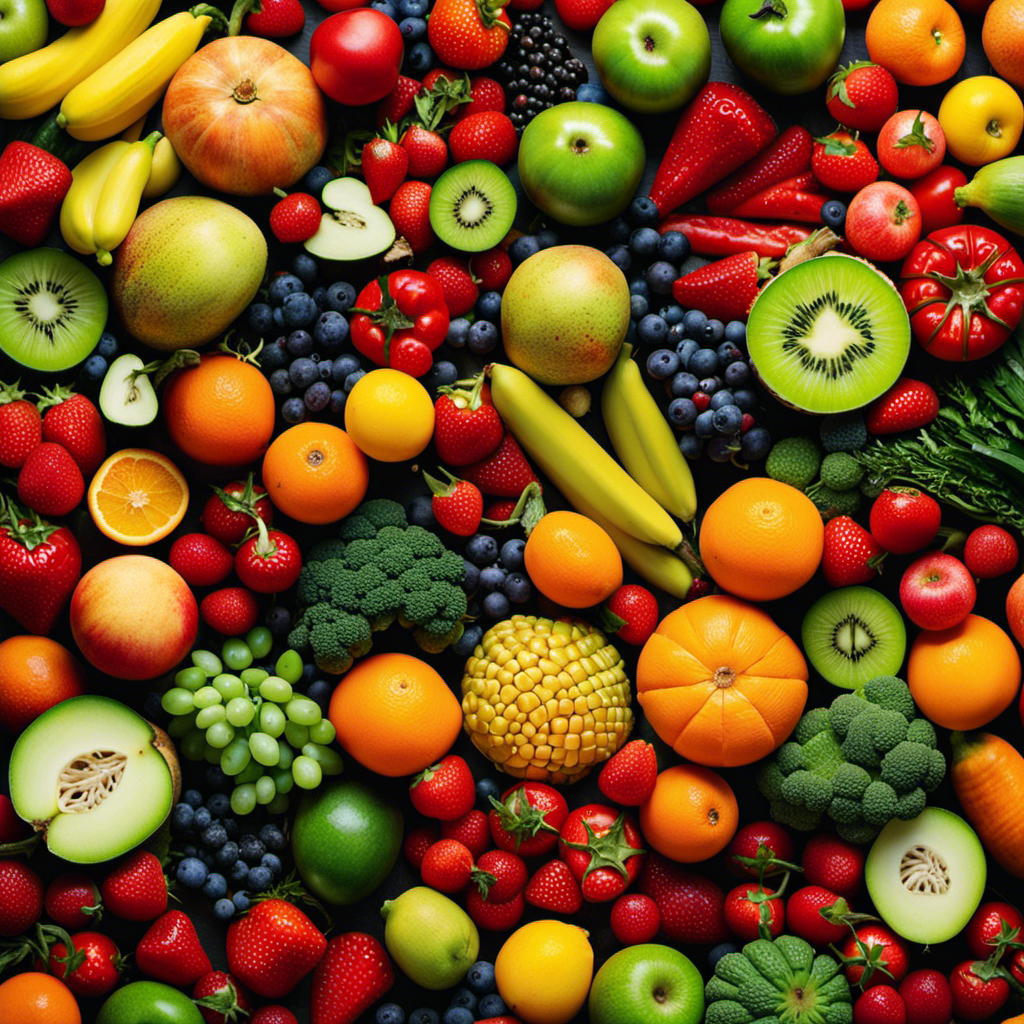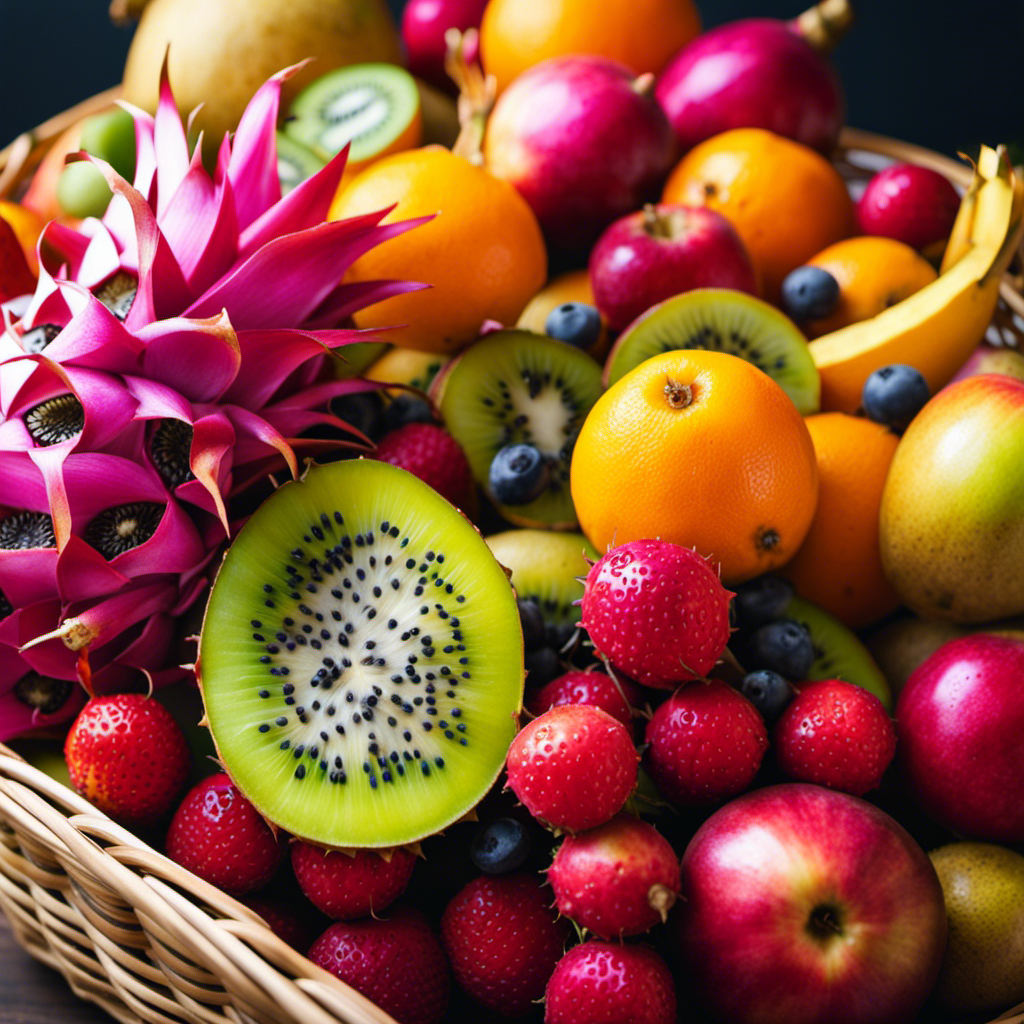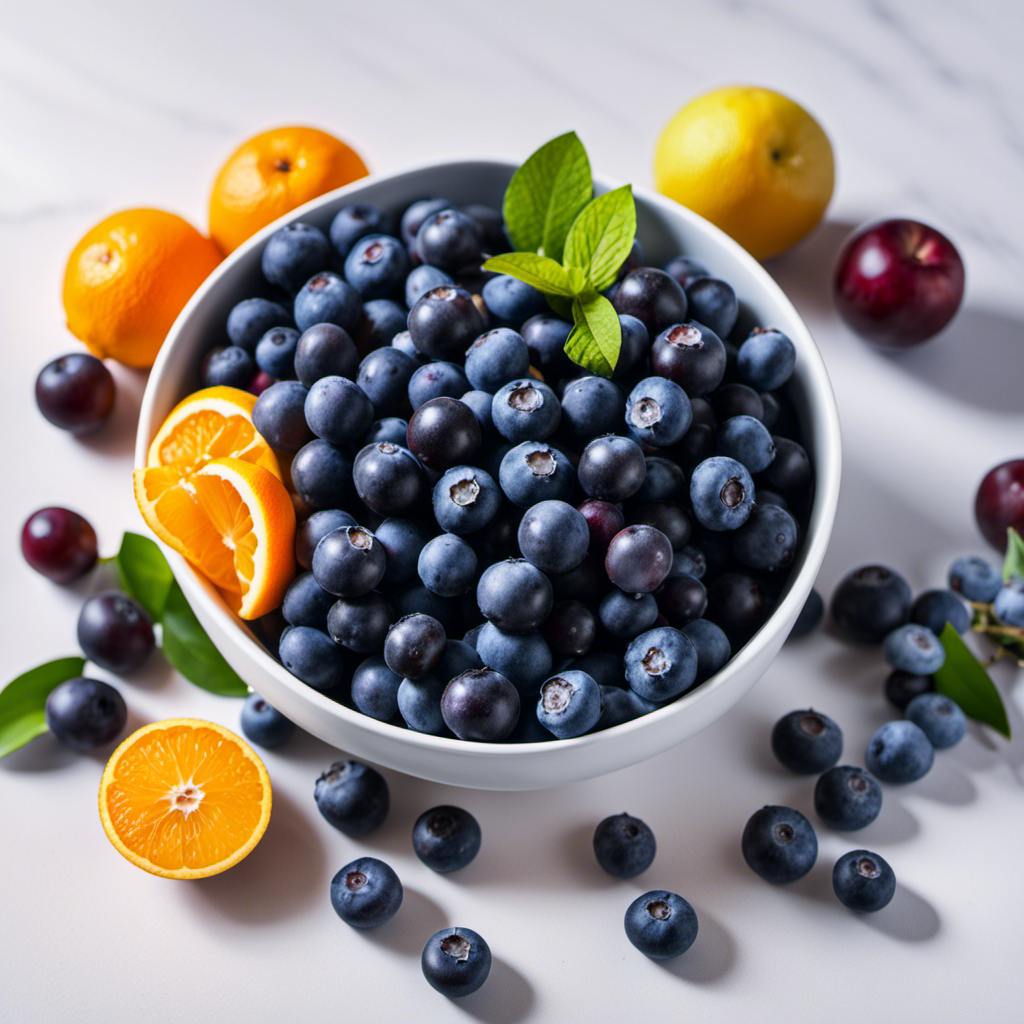Are you looking for some interesting and fun facts about nutritious fruits and vegetables? Well, look no further! In this article, we’ve compiled the top 15 facts that will not only educate you but also entertain you.
From the health benefits of apples to surprising facts about carrots, this article has it all.
So, sit back, relax, and get ready to dive into the fascinating world of fruits and vegetables.
Let’s get started!
Key Takeaways
- Apples improve digestive health and are packed with dietary fiber
- Oranges are a vitamin C powerhouse and support a healthy immune system
- Leafy greens like spinach and kale are nutrient-dense and aid in weight loss
- Blueberries are antioxidant powerhouses and can improve memory and cognitive function
The Health Benefits of Apples
Did you know that eating apples can help improve your digestive health?
Apples are not only delicious but also packed with health benefits. They contain a good amount of dietary fiber, which aids in digestion and prevents constipation. The fiber in apples helps to regulate bowel movements and keeps your digestive system running smoothly.
Additionally, apples are rich in antioxidants, vitamins, and minerals that promote overall well-being. There are several apple varieties to choose from, each with its own unique flavor and texture. Whether you prefer the crispness of a Granny Smith or the sweetness of a Honeycrisp, there is an apple variety for everyone’s taste buds.
So why not incorporate more apples into your diet and enjoy the numerous health benefits they offer?
Interesting Facts About Bananas
You’ll be surprised to learn that bananas are the most consumed fruit in the world. They are not only delicious, but also packed with essential nutrients that promote good health. Here are some interesting facts about bananas:
| Fact | Description |
|---|---|
| Banana Cultivation | Bananas are grown in over 150 countries, making it one of the most widely cultivated crops worldwide. |
| Nutritional Value | Bananas are a great source of potassium, vitamin C, and dietary fiber. They also contain vitamins B6 and A, as well as magnesium and iron. |
| Varieties | There are more than 1,000 different varieties of bananas available worldwide. Some popular ones include Cavendish, Lady Finger, and Plantain. |
Whether you enjoy them on their own or add them to your favorite recipes, bananas offer a sweet taste and numerous health benefits. So go ahead, grab a banana and join the millions of people around the world who enjoy this versatile fruit every day!
The Nutritional Value of Oranges
Did you know that oranges are a vitamin C powerhouse?
This citrus fruit is packed with this essential nutrient, which plays a crucial role in supporting your immune system.
Vitamin C Powerhouse
If you’re looking to boost your Vitamin C intake, oranges and strawberries are two delicious options. These citrus fruits are not only tasty but also packed with nutrients. Vitamin C is an essential nutrient that helps support a healthy immune system, promotes collagen production for healthy skin, and acts as a powerful antioxidant in the body. Here’s a table showcasing the vitamin C content of oranges and strawberries:
| Fruit | Vitamin C Content (mg) |
|---|---|
| Oranges | 69 |
| Strawberries | 58 |
As you can see, both fruits are excellent sources of vitamin C. Incorporating these fruits into your diet can help ensure that you meet your recommended daily intake of this important nutrient. So go ahead and enjoy some juicy oranges or sweet strawberries to give your immune system a boost!
Immune System Booster
Oranges and strawberries are both excellent sources of vitamin C, which can help boost your immune system. Strengthening your immune system is important for preventing illnesses and staying healthy.
Along with consuming fruits rich in vitamin C, there are other ways to strengthen your immune system. Regular exercise, getting enough sleep, managing stress levels, and maintaining a balanced diet are all crucial factors.
Additionally, staying hydrated by drinking plenty of water is essential for a well-functioning immune system. Incorporating probiotics into your diet through foods like yogurt or taking supplements can also support the health of your gut microbiome, which plays a significant role in immune function.
Surprising Facts About Carrots
Carrots are not just great for your eyesight, they also provide a good source of fiber. Here are some surprising facts about carrots that might make you want to include them in your diet more often:
- Surprising carrot varieties: Did you know that carrots come in different colors? Apart from the common orange variety, you can find purple, yellow, white, and even black carrots! Trying out these different colors can add an exciting twist to your meals.
- Carrot recipes for kids: If you have picky eaters at home, incorporating carrots into their meals can be a challenge. But there are creative ways to make it happen! Consider making carrot sticks with a tasty dip or adding shredded carrots to muffins or pancakes. These kid-friendly recipes will help ensure they get their daily dose of nutrients without any fuss.
- Health benefits: Apart from being rich in vitamins and minerals, carrots also contain antioxidants that help protect against diseases. They are low in calories and high in water content, making them a great option for weight management and hydration.
Including these surprising carrot varieties and trying out fun carrot recipes for kids will not only provide nutritional benefits but also make mealtime more enjoyable for the whole family. So go ahead and give those orange wonders a try!
The Importance of Leafy Greens
Remember to include leafy greens like spinach and kale in your meals, as they are packed with essential vitamins and minerals for optimal health. Leafy greens not only help with weight loss but also contribute to glowing skin. These nutrient-dense vegetables provide a wide range of benefits due to their high content of antioxidants, fiber, and phytochemicals. Incorporating leafy greens into your diet can aid in weight management by providing low-calorie options that keep you feeling full for longer periods. Additionally, the vitamins A and C found in leafy greens promote collagen production, resulting in healthier and more radiant skin. So make sure to add a variety of leafy greens to your plate for both a slimmer waistline and beautiful complexion.
| Weight Loss | Glowing Skin |
|---|---|
| Low in calories | Rich in antioxidants |
| High in fiber | Promotes collagen production |
| Keeps you feeling full | Nourishes the skin |
| Provides essential nutrients | Enhances radiance |
Table: Benefits of Leafy Greens
Fun Facts About Strawberries
You’ll be surprised to know that strawberries are not only delicious but also rich in vitamin C, providing a boost to your immune system.
Apart from their nutritional value, strawberries have interesting facts related to their cultivation and potential for various recipes.
When it comes to strawberry cultivation, they prefer well-drained soil and full sun exposure. They can be grown in containers or directly in garden beds.
For those who love cooking, strawberries offer endless possibilities. From classic strawberry shortcake and jam to refreshing salads with goat cheese and balsamic glaze, there’s something for everyone. You can also experiment with strawberry smoothies, ice cream toppings, or even savory dishes like strawberry salsa for a unique twist.
So whether you’re a fan of sweet treats or looking to add flavor to your meals, strawberries are an excellent choice!
The Unique Properties of Avocados
Now that you’ve learned some fun facts about strawberries, let’s dive into the unique properties of avocados.
Did you know that avocados are technically a fruit and not a vegetable? They are also one of the few fruits that contain healthy fats, which can help lower bad cholesterol levels in your body.
Avocados have a creamy texture and are incredibly versatile when it comes to cooking. From guacamole to avocado toast, there are endless possibilities for incorporating this nutritious fruit into your meals.
In addition to their delicious taste, avocados also offer numerous health benefits. They are packed with vitamins and minerals like potassium, vitamin K, vitamin E, and folate.
So why not try some of these unique avocado recipes and reap the numerous health benefits they provide?
The Benefits of Eating Blueberries
Blueberries are an antioxidant powerhouse, packed with vitamins and minerals that can help fight free radicals in your body. Not only are they delicious, but they also have numerous benefits for your brain health.
Regular consumption of blueberries has been shown to improve memory and cognitive function. Additionally, these little berries can support heart health by reducing the risk of heart disease and lowering blood pressure.
Antioxidant Powerhouse
Don’t overlook the antioxidant powerhouse that is spinach. It’s packed with nutrients to keep you healthy!
Spinach has long been hailed for its incredible antioxidant properties, making it a true superfood. These antioxidants help protect your body from harmful free radicals, which are unstable molecules that can damage cells and contribute to diseases like cancer and heart disease.
In addition to its antioxidant status, spinach is also rich in vitamins A, C, E, and K, as well as minerals like iron and calcium. Incorporating this leafy green into your diet can boost your immune system, support healthy vision, promote strong bones, and even improve digestion.
So don’t forget to add some spinach to your meals for a delicious and nutritious way to stay healthy!
Boosts Brain Health
Spinach is also beneficial for brain health. It contains nutrients that support cognitive function. This leafy green vegetable is packed with vitamins and minerals that are essential for a healthy brain.
Spinach is rich in antioxidants. These antioxidants help protect the brain from oxidative stress and reduce the risk of age-related cognitive decline. It also contains folate, which plays a key role in neurotransmitter synthesis and helps regulate mood and memory.
Additionally, spinach is a good source of iron. Iron is necessary for proper oxygenation of the brain cells. By including spinach in your diet regularly, you can boost your memory and enhance your cognitive function.
So next time you’re looking to give your brain a little extra love, reach for some delicious spinach!
Supports Heart Health
Eating a diet rich in fruits and vegetables, like blueberries and spinach, can support heart health. Here are some reasons why incorporating these nutritious foods into your meals can be beneficial for your cardiovascular system:
- Fruits:
- Berries: Blueberries, strawberries, and raspberries are packed with antioxidants that help reduce inflammation and lower the risk of heart disease.
- Citrus fruits: Oranges, lemons, and grapefruits contain vitamin C, which supports healthy blood vessels.
- Vegetables:
- Leafy greens: Spinach is a great source of vitamins A and C, as well as potassium. These nutrients promote heart health by reducing blood pressure.
- Cruciferous vegetables: Broccoli and cauliflower contain fiber that helps lower cholesterol levels.
By including a variety of fruits and vegetables in your diet, you can enjoy the delicious flavors while reaping the cardiovascular benefits they offer.
So go ahead and make your heart happy!
Fascinating Facts About Tomatoes
Did you know that tomatoes are technically a fruit, not a vegetable? Despite being commonly categorized as a vegetable, tomatoes belong to the fruit family due to their seeds and structure.
Tomatoes come in various varieties, each with its own unique flavor and appearance. From juicy beefsteak tomatoes to sweet cherry tomatoes, there is a tomato for every taste preference.
When it comes to cultivation techniques, tomatoes thrive in well-drained soil with plenty of sunlight. They require regular watering and benefit from the use of stakes or cages for support as they grow. Pruning the plants helps increase air circulation and reduce disease risk.
Whether you enjoy them raw in salads or cooked in sauces, these versatile fruits are packed with essential nutrients like vitamins A and C, making them a nutritious addition to your diet.
The Nutritional Power of Spinach
Did you know that spinach is not only delicious but also incredibly nutritious? Packed with vitamins A, C, and K, as well as iron and calcium, spinach offers a wide range of health benefits.
In addition to discussing its nutritional power, we will also explore some mouth-watering recipes that incorporate this leafy green into your meals.
So get ready to learn about the amazing health benefits of spinach and discover new ways to enjoy it in your everyday cooking!
Health Benefits of Spinach
You can easily incorporate spinach into your daily meals to reap its numerous health benefits. Here are three reasons why spinach should be a regular part of your diet:
- Boosts immune system: Spinach is packed with vitamins and minerals that help strengthen your immune system, protecting you from illnesses and infections.
- Promotes healthy digestion: Spinach is rich in fiber, which aids in digestion and prevents constipation. It also contains antioxidants that reduce inflammation in the digestive tract.
- Supports bone health: Spinach is an excellent source of calcium, vitamin K, and magnesium, all of which play a crucial role in maintaining strong bones and preventing osteoporosis.
To make it even more enticing, there are plenty of delicious recipes using spinach available online. From salads to smoothies to sautéed dishes, incorporating this versatile leafy green into your meals is easy and enjoyable.
So go ahead and add some spinach to your plate for a nutritious boost!
Recipes Using Spinach
There are plenty of delicious recipes available online that incorporate spinach, making it easy and enjoyable to add this versatile leafy green to your meals. Whether you’re a seasoned chef or just starting out in the kitchen, there’s something for everyone when it comes to cooking with spinach. From salads and soups to stir-fries and smoothies, the possibilities are endless. Check out the table below for a few recipe ideas using spinach:
| Recipe | Cooking Technique |
|---|---|
| Spinach Salad with Strawberries | Tossing |
| Creamy Spinach and Artichoke Dip | Baking |
| Spinach and Feta Stuffed Chicken Breast | Grilling |
These recipes not only showcase the vibrant color and fresh flavor of spinach but also highlight different cooking techniques. So go ahead, explore new flavors, and create nutritious meals that will leave you feeling satisfied and nourished.
Interesting Facts About Grapes
Grapes are not only delicious, but they also contain antioxidants that can benefit your overall health.
Did you know that there are over 8,000 grape varieties in the world? Each variety has its own unique flavor profile and characteristics.
From sweet and juicy table grapes to tart and acidic wine grapes, there is a grape for every palate.
Grape cultivation techniques vary depending on the desired outcome. For table grapes, farmers focus on maximizing sweetness and juiciness by carefully managing irrigation and sunlight exposure.
On the other hand, wine grape growers pay special attention to factors such as soil composition, climate, and timing of harvest to achieve optimal flavors for winemaking.
So next time you enjoy a bunch of grapes or sip a glass of wine, remember the diverse world of grape varieties and the careful cultivation techniques behind them!
The Importance of Eating Broccoli
If you’re looking to improve your overall health, incorporating broccoli into your diet is a smart choice.
Not only is it packed with essential nutrients like vitamins C and K, but it also provides dietary fiber and antioxidants that can support your immune system and promote healthy digestion.
Plus, cooking broccoli doesn’t have to be complicated – steaming or roasting are easy ways to bring out its natural flavors and retain its nutritional benefits.
Adding broccoli to a balanced diet can help ensure you’re getting the nutrients your body needs for optimal functioning and well-being.
Nutritional Benefits of Broccoli
You should definitely include broccoli in your diet because it is packed with essential vitamins and minerals.
Broccoli has numerous health benefits that can contribute to your overall well-being. It is a great source of vitamin C, which helps boost your immune system and protect against common illnesses.
Additionally, broccoli contains fiber, which aids in digestion and promotes a healthy gut. This cruciferous vegetable also provides important antioxidants that can help reduce the risk of chronic diseases such as heart disease and certain types of cancer.
When cooking broccoli, it’s best to steam or lightly sauté it to retain its nutritional value. Avoid overcooking, as this can lead to nutrient loss.
So make sure you add broccoli to your meals regularly for its incredible health benefits!
Easy Ways to Cook Broccoli
One easy way to cook broccoli is by roasting it in the oven with some olive oil and your favorite seasonings. This method brings out the natural sweetness of the vegetable and adds a delicious flavor.
To start, preheat your oven to 425°F (220°C) and cut the broccoli into florets. Toss them in a bowl with olive oil, salt, pepper, and any other spices you like.
Next, spread the seasoned broccoli out on a baking sheet and roast for about 20 minutes until they are tender and slightly crispy.
Another kid-friendly recipe is cheesy broccoli bites. Start by steaming the broccoli until it’s soft. Then, mix it with cooked quinoa, shredded cheddar cheese, eggs, breadcrumbs, and seasonings.
Once the mixture is well combined, shape it into bite-sized balls and place them on a baking sheet. Bake at 375°F (190°C) for about 15 minutes until they turn golden brown.
These recipes are not only easy but also a great way to make broccoli more appealing to kids while still retaining its nutritional benefits.
Broccoli in a Balanced Diet
Including broccoli in your diet can help ensure you’re getting a good balance of vitamins, minerals, and fiber. Broccoli plays a significant role in weight loss due to its low calorie content and high fiber content. It fills you up without adding extra pounds, making it an excellent addition to any weight loss plan.
Furthermore, broccoli is packed with nutrients that support gut health. Its high fiber content aids digestion and promotes regular bowel movements, preventing constipation. Additionally, broccoli contains compounds like glucosinolates that support the growth of beneficial bacteria in the gut, improving overall gut health.
Fun Facts About Watermelon
Watermelon is a delicious and hydrating fruit that is perfect for summer. Not only does it quench your thirst, but it also provides numerous health benefits.
Did you know that watermelon is packed with vitamins A and C, which help boost your immune system? It’s also a great source of hydration, as it contains about 92% water. But the benefits don’t stop there!
Watermelon is also rich in antioxidants that can help protect your body from harmful free radicals. And here’s a fun fact: did you know that watermelons come in different colors, including yellow and orange?
So next time you’re looking for a refreshing treat, grab some watermelon and enjoy its delicious taste while reaping all its amazing benefits!
The Benefits of Consuming Bell Peppers
Bell peppers are a versatile and nutritious vegetable that can provide numerous health benefits. They are packed with vitamins A, C, and E, which are essential for healthy skin. The antioxidants found in bell peppers help protect the skin from damage caused by free radicals, reducing signs of aging and promoting a youthful glow.
To incorporate bell peppers into your meals, try adding them to salads or stir-fries for added crunch and flavor. You can also stuff them with a mixture of lean protein, grains, and vegetables for a delicious and nutritious meal. Another way to enjoy bell peppers is by slicing them up and using them as dippers for hummus or other healthy dips.
With their vibrant colors and incredible health benefits, bell peppers are a fantastic addition to any diet.
Fascinating Facts About Pineapple
Did you know that pineapples are a great source of vitamin C and manganese, which can help support your immune system and promote healthy bone development?
Pineapple cultivation has a rich history dating back to ancient times. Originally from South America, it was brought to Europe by Christopher Columbus in the late 15th century. The fruit is named ‘pineapple’ due to its resemblance to a pinecone.
Today, pineapple is grown in tropical regions around the world, with countries like Thailand and the Philippines being major producers. Cultivating pineapples involves planting the crown (the leafy top) of a mature fruit in fertile soil. It takes about 18 months for a pineapple plant to produce fruit, but once it does, it’s worth the wait!
So next time you enjoy this sweet tropical treat, remember its fascinating history and nutritional benefits.
Frequently Asked Questions
How Many Grams of Fiber Are in an Average-Sized Apple?
An average-sized apple contains about 4 grams of fiber, which is beneficial for digestion. Bananas also provide a good amount of fiber. Including these fruits in your diet can help support a healthy digestive system.
Can Bananas Help Improve Digestion?
Bananas can be beneficial for improving digestion. They contain dietary fiber, which helps regulate bowel movements and promote a healthy gut. Including bananas in your diet may contribute to better digestive health.
What Is the Vitamin C Content in One Medium-Sized Orange?
In one medium-sized orange, there is a good amount of vitamin C. It’s great for your skin health too! So go ahead and enjoy an orange to boost your vitamin intake and keep your skin glowing.
Do Carrots Have Any Health Benefits for Eye Health?
Carrots do have health benefits for eye health. Carotenoids in carrots, such as beta-carotene, are converted into vitamin A in your body, which is essential for good vision. So yes, carrots really do improve eyesight!
Which Leafy Greens Are Considered the Most Nutrient-Dense?
Leafy greens like kale, spinach, and Swiss chard are considered the most nutrient-dense. They provide essential vitamins and minerals for overall health. Incorporating these leafy vegetables into your diet can greatly benefit your nutrition.
Conclusion
In conclusion, you now have a wealth of knowledge about the health benefits and nutritional value of various fruits and vegetables.
From the incredible antioxidants in apples to the surprising facts about carrots, these foods are not only delicious but also packed with essential nutrients for your well-being.
So next time you’re at the grocery store or planning a meal, remember to include these nutritious options like oranges, broccoli, watermelon, bell peppers, and pineapple.
Your body will thank you!





